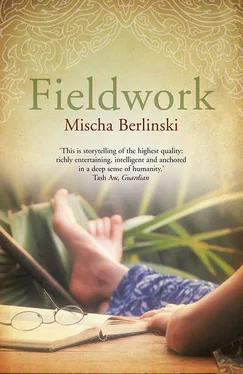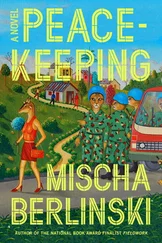"I knew old Farts-a-Lot," he said.
"You did?"
"Biggest pain in the backside you ever met. Last saw him a few years back. He was a Christian for a while, backslid. Couldn't keep away from the lao-kao ." He used the Thai word for rice whiskey. "Did you know she used to come by the house?"
"When?"
"Back in the early days here in Thailand. Back in the 1970s."
Back when David was alive . Before David went away on Dead Tour. "Did she come by the house often?" I asked.
"Oh, yes sir, she used to come by the house all the time. She used to come to our house and ask us questions, and we'd tell her about the Dyalo as best we could. I met her at the bank."
"The bank?" These little prompts kept Mr. Walker talking. I think they were a psychological device by which, should the necessity arise, he would be able to justify the conversation to Norma: "Why, honey, I was just answering the young man's questions. Curious little guy."
"Yep. I was standing in line with my daughter Linda-Lee, we were chatting in Dyalo like we do, and this woman starts staring at us. Farang woman, and she says to us, not in the best Dyalo, but we could understand, she says, ‘You are Dyalo speakers too!' I could hear her American accent, so I said back to her in English, ‘Of course!' We got to talking, and when we heard about her work we invited her back to the house for dinner."
After David's death, all of the Walkers would say that they saw something rotten or malicious in Martiya when she first showed up at the house in the fall of 1977, but in truth only Norma said anything at the time.
The other Walkers, when they sat around talking about her after she left, decided in the collective fashion of large families that they liked her, probably in the same kind of way they more or less liked me: the Walkers could never really be at ease with anyone who hadn't vigorously accepted Jesus Christ as his personal savior — that was simply too big a chasm in understanding to overcome — but they found her lively and interesting, with an odd take on the Dyalo, as when she described them as "strictly exogamous from the clan." Laura Walker, who despite a lifetime of acquaintanceship with the Dyalo had always found them a foreign people, was especially taken with the confusions of the young anthropologist, and sent her home with a freshly baked loaf of banana bread. Raymond Walker remarked on Martiya's beautiful green-gray eyes. The younger Walkers — David, his siblings, his cousins — liked Martiya too: they had never met anyone like her, somebody so clearly of their generation but not of their world. When they said grace before dinner, twelve-year-old Margaret noticed that Martiya did not close her eyes. Seeing Margaret and catching her staring, Martiya had smiled — an expression so inappropriate to prayer time that Margaret wondered whether God would still bother to bless the meal. If God didn't bless the meal, Margaret later asked her mother, would it still be worth eating, with protein and calories and stuff? Margaret also noticed that Martiya wore dark red lipstick, which interested her intensely.
All that evening Martiya peppered the Walkers with questions.
"You mean that you think the spirits are actually — I don't know— what's the word? Real? They're not just something that the Dyalo invented?" she asked, in response to some remark which began, no doubt, "Two thousand years!"
"Absolutely real," Thomas said. "No question about it."
"Have you seen a spirit?" Martiya asked.
"Never seen Africa but I'd bet that it's there. The Dyalo aren't the first, not by any means, to be oppressed by such devils. In the first six chapters of the Gospel of Mark alone, there are ten references — ten! — to the casting out of devils. The New Testament is just chockablock with devils, demons. Now think about that a moment. The Jews in ancient Israel, the Dyalo in the eastern Himalayas, thinking the same way, with the same beliefs — that's a mighty strange coincidence. People in every corner of the world believe in spirits, ghosts, what have you. It's not a coincidence."
"And these spirits are enslaving the Dyalo?"
Thomas sighed at the simplification of the complicated relationship between the Dyalo and the spirits who controlled them. "I'd certainly say the spirits are bullies and brutes. They're ugly creatures, no doubt about it. And the Dyalo are sick and tired of being told by these ugly creatures what to do. When someone who's bigger than you and meaner than you and stronger than you tells you what to do — wouldn't you call that slavery?"
Martiya thought for a moment. "In the village where I'm staying, the people say that Old Grandfather spirit protects them. And they have ancestor spirits. They don't talk about being enslaved by them."
Thomas snorted. "First, according to the Bible, which is quite clear on this point, human spirits don't linger on the Earth, but only those unclean demon spirits which occupy the body before death. That's one of God's promises to us, that when we're done here, he'll take us Home or send us to our punishment. So I think that's a confusion the Dyalo are making. Those aren't the spirits of the ancestors the Dyaloare worshipping but deceivers —spirits taking human form to confuse the Dyalo. Now, about Old Grandfather. Hah! When I was a kid, there used to be a Chinese warlord, came by the mission every few weeks. Said he'd protect us. We asked him, ‘What happens if you don't protect us?' He said, ‘My soldiers will cut off your heads.' That's how Old Grandfather protects the Dyalo."
"What did you do?" asked Martiya.
"Do?"
"About the warlord."
"Oh, yes. Dad here" — Thomas gestured toward his father, who sat at the head of the table, smiling gently—"well, Dad here told that warlord, ‘Go on and cut off our heads. Cut off anything you like. God sent us this money so we can work with the people, not to give to you. But if you want, I'll give you something worth much, much more than gold.' Well, that warlord, he wasn't happy about that, not one bit, let me tell you. What is he going to do with our heads? The next day, the warlord came back, and Dad said the same thing. We knew the Lord would protect us. Day after that, the warlord came back and asked to be baptized in the name of Christ."
Like me, I imagine, Martiya was not quite sure how to respond to the Walkers' more extraordinary stories. "Did the warlord explain what happened, why he changed?"
"The man was filled in the night with the Holy Spirit. He said that any God which made people so courageous must be worth believing in. We've seen things like that happen more times than you can count." The table fell silent a moment. Raymond cleared his throat. "You're asking very important questions, young lady. And let me tell you, when we first came to China in 1920, a very long time ago—"
Laura interrupted, "Oh my, yes."
"— I had an attitude very similar to yours, I thought that spirits were only something you read about in the Bible, something that only bothered people in biblical times. I certainly didn't realize the magnitude of the problem. It took me a considerable period to realize that defeating the spirits in our day and age , right here, defeating them through the aid of our Lord and Savior Jesus Christ was the significant spiritual challenge of our time. But Grandma Walker and myself, we saw case after case of it, wandering through those villages, until we finally had to put aside our white colonial master attitude and admit that these people might know something about something. We arrived in village after village and were told when we tried to set up our tent, ‘Oh no! Don't put up your tent near that rock! There's a nasty spirit who lives there, he'll get angry with you.' Or, ‘Don't talk too loud in the rice field. The rice spirit hates loud noises.' We learned."
Читать дальше












